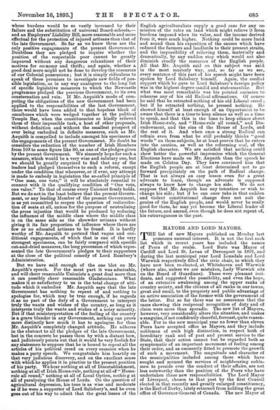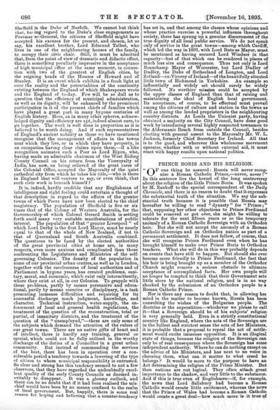MAYORS AND LORD MAYORS. T HE list of new Mayors published
on Monday last possesses unusual interest. It is not the first such list which in recent years has included the names of Peers of the realm. Lord Bute was Mayor of Cardiff and Lord St. Levan of Devonport in 1891, and' during the last municipal year Lord Lonsdale and Lord Warwick respectively filled the civic chair, to which they have now been re-elected, at Whitehaven and Warwick (where also, unless we are mistaken, Lady Warwick sits- on the Board of Guardians). These were pleasant inci- dents, and suggested the possibility, and even the hope,. of an extensive awakening among the upper ranks of country society, and the citizens of all ranks in our towns, great and small, to the propriety and public advantage of an active association of the former with the government of the latter. But so far there was no assurance that the cases showing this reciprocal recognition of duty and of claim were more than sporadic. The new list of Mayors, however, very considerably alters the situation, and makes a sanguine, if not confidently cheerful, forecast, quite reason- able. For in the new municipal year no fewer than eleven Peers have accepted office as Mayors, and they include noblemen of such high distinction, in respect both of hereditary rank and of past and present service to the State, that their action cannot but be regarded both as symptomatic of an important movement of feeling among their order, and as eminently fitted to promote the growth of such a movement. The magnitude and character of the municipalities included among those which have sought and secured the services of neighbouring noble- men to preside over the conduct of their affairs, are not less noteworthy than the position of the Peers who have undertaken these new responsibilities. The Lord Mayor of Liverpool, chosen to that post by the first Council elected in that recently and greatly enlarged constituency,. is the Earl of Derby, lately returned from holding the great office of Governor-General of Canada. The new Mayor of Sheffield is the Duke of Norfolk. We cannot but think that, ha\ ing regard to the Duke's close engagements as Postmas'er-General, the citizens of Sheffield might have accepted his excuses for the present, and chosen, let us say, his excellent brother, Lord Edmund Talbot, who lives in one of the neighbouring houses of the family, to occupy their civic chair. Still, it must be admitted that, from the point of view of dramatic and didactic effect, there is something peculiarly impressive in the acceptance of high municipal office at the same moment, in connec- tion with two of the greatest of English cities, by the reigning heads of the Houses of Howard and of Stanley. It is an event which exhibits in a fresh light at once the reality and the potentialities of the continuity existing between the England of which Shakespeare wrote and the England of to-day. Few will be so dull as to question that the efficiency of municipal administration, as well as its dignity, will be enhanced by the prominent participation in it of the present chiefs of families which have played a great part in many bygone centuries of English history. Here, as in many other spheres, acknow- ledged dignity and efficiency are apt, indeed almost sure, to go together. The work is well done in proportion as it is believed to be worth doing. And if such representatives of England's ancient nobility as those we have mentioned recognise that the management of affairs in the towns near which they live, or in which they have property, is an occupation having clear claims upon them,—if a like recognition animates such a Peer as Lord Ripon, who, having made an admirable chairman of the West Riding County Council on his return from the Viceroyalty of .India, has now, on being relieved of the great cares of the Colonial Office, accepted the Mayoralty of the quiet cathedral city from which he takes his title,—who is there in England that will venture to say, or even think, that such civic work is beneath himself ?
It is, indeed, hardly credible that any Englishman of intelligence and right feeling could entertain a thought of that description in regard to the affairs of the greater towns of which Peers have now been elected to the chief magistracy. The population of Sheffield is five or six times that of the Colony of Western Australia, for the Governorship of which Colonel Gerard Smith is setting forth amid many very suitable manifestations of public interest. The population of that "greater Liverpool " of which Lord Derby is the first Lord Mayor, must be nearly equal to that of the whole of New Zealand, if not to that of Queensland and South Australia combined. The questions to be faced by the elected authorities of the great provincial cities at home are, in many respects, even more anxious and complicated than those confronting the Legislatures and Ministries of the self- governing Colonies. The density of the population in some of our provincial urban centres, as well as in London, together with the carelessness of local authorities and of Parliament in bygone years, has created problems, sani- tary, moral, and economic, which exist only intermittently, where they exist at all, in our Colonies. To grapple with these problems, partly by means persuasive and educa- tional, partly by means coercive or disciplinary, is a task presenting immense difficulties and requiring for its successful discharge much judgment, knowledge, and character. Technical instruction, water-supply, the en- forcement of local and general health regulations, the treatment of the question of the reconstruction, total or partial, of insanitary districts, and the treatment of the . question of the "unemployed,"—these are only some of the subjects which demand the attention of the rulers of our great towns. There are no native gifts of heart and of intellect, there is hardly any training, general or special, which could not be fully utilised in the worthy discharge of the duties of a Councillor in a great urban community. But instead of commanding the services of the best, there has been in operation over a con- siderable period a tendency towards a lowering of the type of citizen to whom municipal responsibility is entrusted. • So clear and strong has this tendency seemed to not a few observers, that they have regarded the undoubtedly excel- lent quality of the early County Councils as doomed in- evitably to disappear. It was a gloomy outlook, and there can be no doubt that if it had been realised the mis- chief would have been by no means confined to the realm of local government. But, happily, there is some real reason for hoping and believing that a counter-tendency has set in, and that among the classes whose opinions and whose practice exercise a powerful influence throughout society, there has sprung up a genuine discernment of the true dignity of all local public service. We do not speak only of service in the great towns—among which Cardiff, which led the way in 1891, with Lord Bute as Mayor, must be mentioned as having secured Lord Windsor in that capacity—but of that which can be rendered in places of much less size and consequence. Thus not only is Lord Beauchamp Mayor of Worcester, but Lord Dudley of Dudley, the Duke of Sutherland of Longton, and Lord Zetland—ex-Viceroy of Ireland—of the beautifully situated little town of Richmond in Yorkshire. An example so influentially and widely set should surely be widely followed. No worthier mission could be accepted by the upper classes of England than that of raising and maintaining the ideal of English local government. Its acceptance, of course, to be effectual must prevail among the citizens of culture and station in the towns as well as among the landed proprietors in the neighbouring country districts. At Leeds the Unionist party, having obtained a majority on the City Council, have done good work by introducing several highly respected townsmen to the Aldermanic Bench from outside the Council, besides electing with general assent to the Mayoralty Mr. W. L. Jackson, formerly Chief Secretary for Ireland. All that is to the good, and wherever this wholesome movement operates, whether with or without external aid, it must react with happy results upon national politics.



















































 Previous page
Previous page